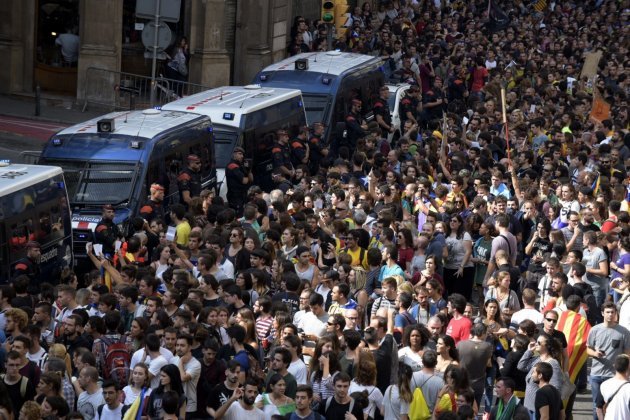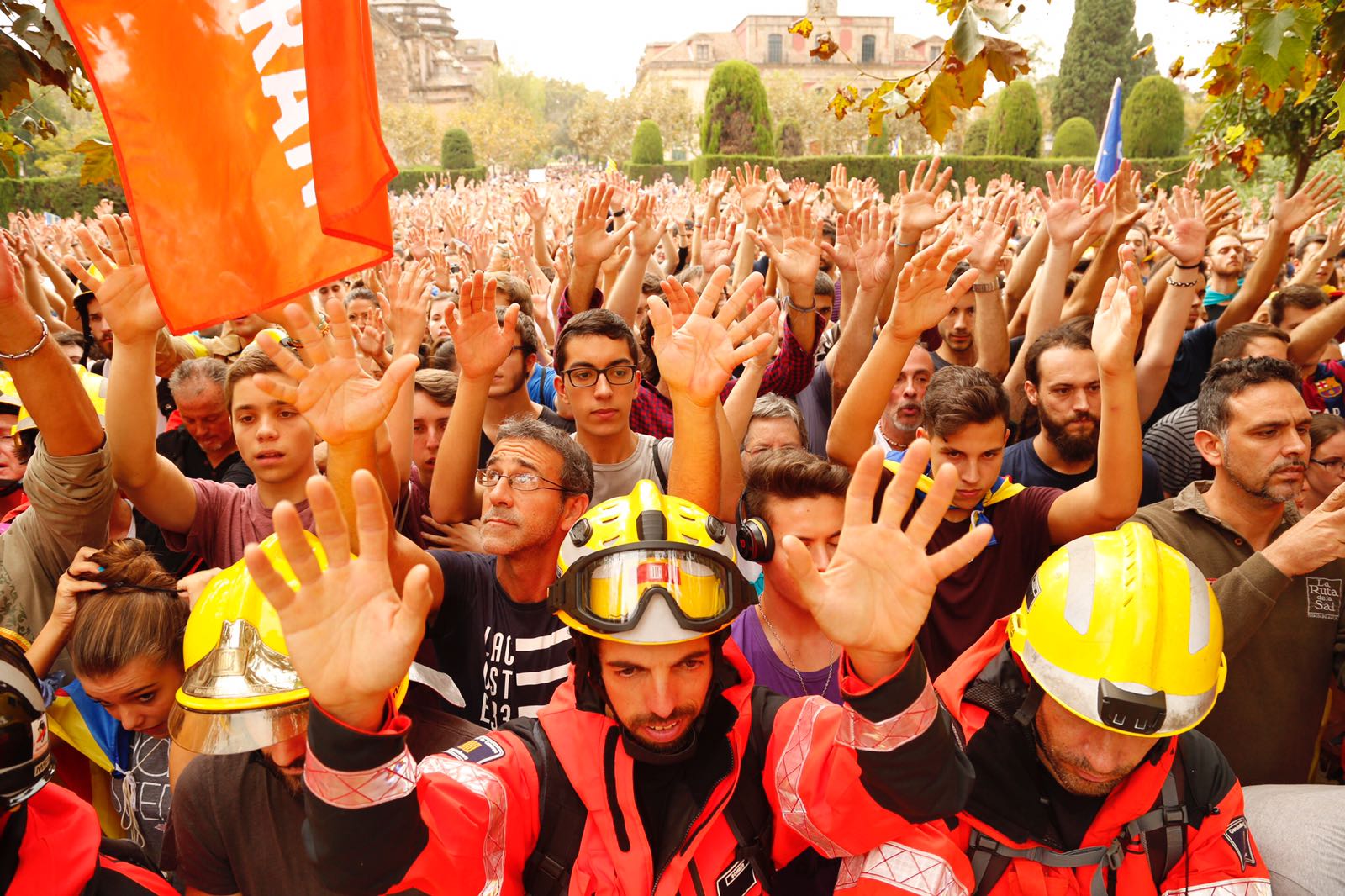Tens of thousands of people have taken to the streets today in Barcelona and across Catalonia to take part in the region-wide standstill and the general strike called in opposition to the police repression of the 1st October independence referendum.
The protesters are responding to the call from the large pro-independence organisations ANC (Catalan National Assembly) and Òmnium, the large unions CCOO (Workers' Commissions) and UGT (General Union of Workers) and a variety of other bodies. These calls followed the call for a general strike from some of the smaller unions, including CGT (General Work Confederation) and COS (Union Workers Coordinator).
From early this morning, roads and motorways have been closed off; Barcelona's metro and the Catalan train operator FGC have suspended all trains and the Spanish train operator RENFE has been running a minimal service; the ports of Barcelona and Tarragona have suspended activity and there has been a standstill at all types of workplace, from the largest, like Mercabarna, a 90-hectare site containing food wholesale markets and Barcelona's abbatoir, to the smallest shops.
But, above all, there have been people in the street since well before midday when gathering were held in front of all of Catalonia's town halls, before the large demonstration at 6pm this evening in Barcelona.
In Barcelona, columns of tens of thousands of protesters, including many students, have formed along the great thoroughfares, including Diagonal, Gran Via and Via Laietana to head to the large demonstrations in plaça Sant Jaume (the square containing the Catalan government palace and Barcelona city hall) and Ronda Universitat (the short street joining two of Barcelona's other main squares). Farmworkers, who have closed several roads with their tractors, and firefighters, who have acted as an improvised order force supporting the Mossos d'Esquadra (Catalan police) at many demonstrations, have both played large roles in the protests.
Many protesters gathered in front of the Spanish National Police headquarters on Via Laietana in Barcelona, which had already seen strong protests on Monday for the repression of the referendum, and in front of the Spanish Delegation to Catalonia. Despite the anger and shouts against the police forces and those responsible from the Spanish government, the general tone of the protests has been civility.
There has been no incident, despite the number of people mobilised. Nonetheless, the Madrid government has managed to find ammunition to take aim at the Catalan president, Carles Puigdemont, and the vice-president, Oriol Junqueras, as being responsible for a "siege" of Spanish police. For example, they cite the gatherings in opposition to the Spanish police forces staying in small towns like Calella and Pineda de Mar, some of whom have been thrown out of their hotels after taking part in violence. A statement to this effect was made by the Spanish Interior minister, Juan Ignacio Zoido, who has met with prime minister Mariano Rajoy to evaluate the situation. The leader of Rajoy's PP [Popular Party] in Catalonia, Xavier Garcia Albiol, was loudly booed in Pineda de Mar, where he went this lunchtime to express his support for the Spanish security forces.
From early this morning, there have been calls made for calm on social media. The rule is to avoid succumbing to provocation. The Catalan government is convinced there might occur attempts to break up the gatherings or cause incidents by infiltrated agents in plain clothes.

Nerves are running high at the Moncloa (the Spanish PM's residence) and among the upper echelons of the PP. The party's spokesperson, Rafael Hernando, described the standstill as "Nazi"; later, he suggested that Junqueras and Puigdemont should be banned from public office. The scale of the participation in the region-wide standstill and the peaceful resistance demonstrated by broad sections of society, despite the brutality unleashed by Spanish police and the Civil Guard at referendum polling stations which left more than 800 injured, have set off all the alarms in Madrid.
PSOE (Spanish Socialist Workers' Party) has this morning asked the Spanish Congress to rebuke the deputy prime minister, Soraya Sáenz de Santamaría, for the police violence in Catalonia. PSOE supports the Spanish security forces, but not the use the Madrid government is making of them against Catalan independence supporters. The "constitutionalist" block has started to crack after PSOE's leader, Pedro Sánchez, asked for Puigdemont and the pro-referendum Podemos (We Can) party to be included in the dialogue. PSOE is now closer to Podemos' leader Pablo Iglesias than to the Spanish prime minister, who it seems is only supported by Ciudadanos' (Citizens) Albert Rivera, who asks for stricter action against the "separatists".
The PP government's strategy is crystal clear: twist the reality of events, presenting the agents executing the strategy of repression as its victims with the aim of calming the European Commission and Foreign Offices, which have recently sent warning to Rajoy about the use of force, and, at the same time, build up accusations against Puigdemont and his government that could justify new political and legal measures, be that the suspension of Catalan autonomy using article 155 of the Spanish Constitution (de facto suspension already having taken place in areas like finance or policing) or the removal of the Catalan president and government from office for sedition.

